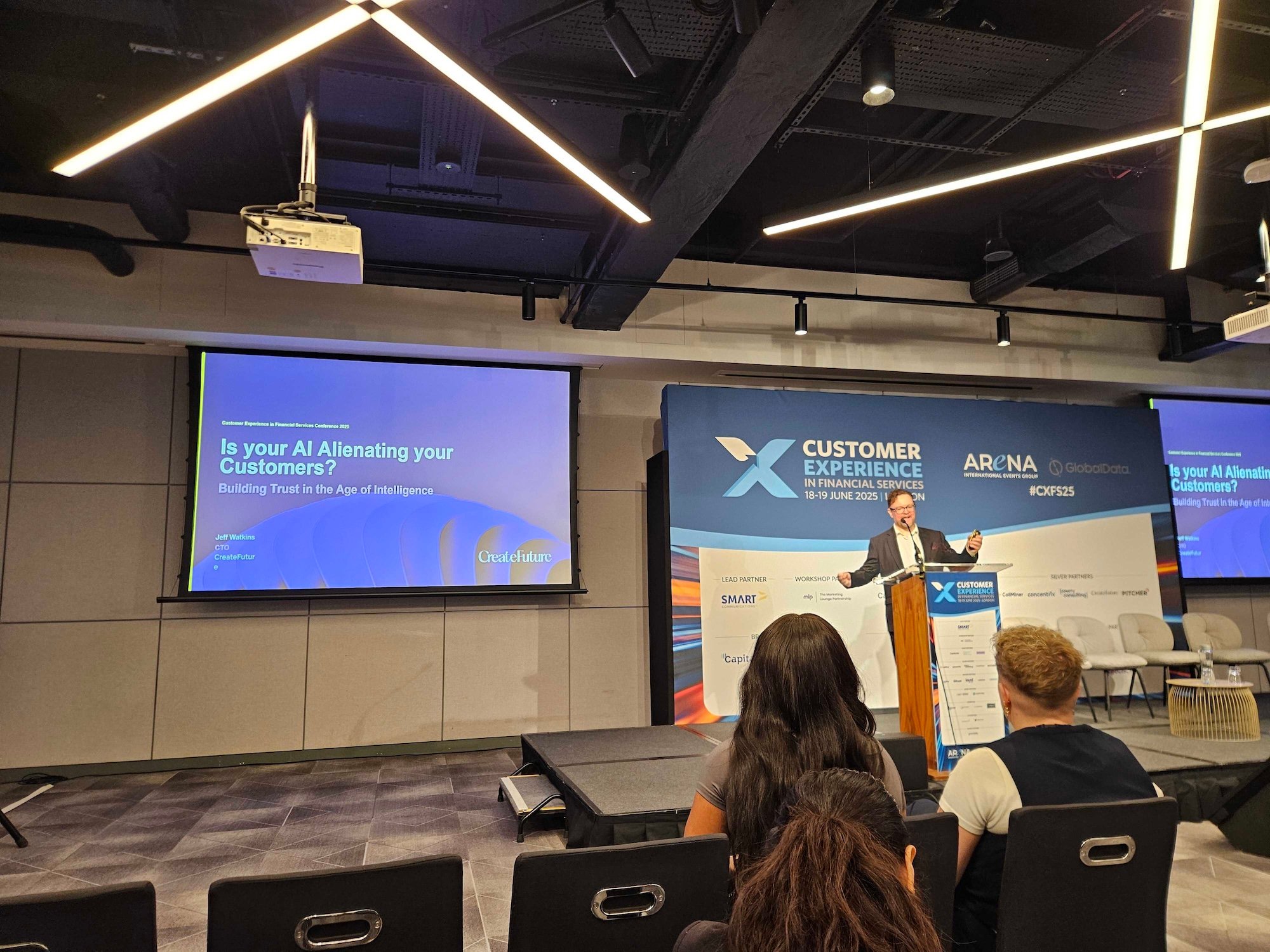Last week, CreateFuture had the privilege of sponsoring the 5th annual Customer Experience in Financial Services conference, where industry leaders gathered for two days of insightful discussions on the latest themes, challenges, and successes in CX excellence.
The insights from this year's conference painted a clear picture of the evolving landscape of CX, moving beyond mere technological adoption to truly impactful human-centred design.
Here are our top 5 themes and key takeaways from a fantastic few days.
1. The evolving role of AI in customer experience
AI was undoubtedly the star of the show, but the conversation has matured beyond simple automation. We're seeing a clear shift towards harnessing AI to augment human capabilities and elevate the customer experience. Hendrik Kleinsmiede (Mastercard) vividly demonstrated this with "vibe coding," showcasing how prompts can generate 70% of an e-commerce site using the V0 vibe coding tool – a tangible step towards Gartner's prediction of Generative AI automating up to 60% of website and app design. This is more than just tools, however; it’s the continued involvement of people and human empathy that will set the most successful experience apart.
Ronit Ghose (Citi) highlighted AI's current biggest use case in coding and software, but also pointed to its direct impact on CX through advanced chatbots, transaction monitoring, and credit underwriting. He also emphasised AI's role as a tool for human augmentation, supported by Conrad Ford (Allica Bank) demonstrating their use of AI in improving internal efficiency in areas like processing and analysing PDF’s, and Brian (Deepdesk) giving examples of advisors using summarising tools to reduce handling time. An AI panel provided further examples in areas such as automating internal processes, training internal teams, and even assisting with complex decision-making like underwriting, pricing and risk assessments.
While opinions on AI's direct customer experience role were mixed, with Conrad Ford (Allica Bank) expressing reticence towards agentic AI, the AI panel generally agreed it should augment human capabilities, indirectly benefiting CX by freeing agents for complex interactions. The "human in the loop" concept is crucial here, especially in regulated industries. Looking ahead, AI's potential in personalising products like insurance based on health and lifestyle data was noted by the AI panel, envisioning truly personalised and seamless customer journeys where AI anticipates needs and offers solutions, all while ensuring ethical deployment.
However, as Jeff Watkins (CreateFuture) underscored, bridging the "Trust Gap"—the relatively low level of trust financial services customers currently have for AI—is crucial, demanding ethical design and a Human-AI trust framework to build meaningful customer relationships. This point was reinforced by Kieran Harris (Natwest), who stressed the importance of ethical design in any AI implementation.
Key Takeaway: AI is rapidly advancing in financial services, automating design, augmenting staff for improved customer service, and enhancing real-time interactions, but successful implementation prioritises human empathy and addresses the "Trust Gap" through ethical design.
2. The Omnichannel Experience: Why we failed and how we can succeed
With AI not yet fully ready for human takeover, the conference highlighted the critical importance of omnichannel experience, a concept the industry has pursued with mixed success. The Omnichannel experience panel explored why the shift from multichannel to omnichannel hasn't fully worked, citing challenges like difficulty at scale, negative chatbot experiences, legacy technology hurdles, a lack of customer focus, and insufficient person-to-person communication skills.
The panel agreed that doing omnichannel at scale is very challenging, and works best for specific segments and needs. True omnichannel success lies in understanding "moments of truth"—when customers need human interaction, especially during stressful situations like fraud or bereavement. Conrad Ford (Allica Bank) stressed the difficulty of seamless transitions across channels, advocating for a "high tech / high touch" middle ground. Hugo Sousa (OakNorth) echoed this, advising to "start with the customer and build both digital and human". Rebecca Brindley (Natwest) emphasised that digital solutions alone are often insufficient, particularly in sensitive banking areas where trust and personalised support are paramount. Ultimately, human empathy remains irreplaceable.
Key takeaway: Achieving broad omnichannel experience in financial services remains challenging, emphasising the need for a customer-centric "high-tech/high-touch" approach that seamlessly integrates digital and human interactions, especially during critical "moments of truth".
.jpg?width=572&height=514&name=20250618_075305(0).jpg)
3. Compassionate design: Prioritising accessibility and vulnerability
Compassionate design was a significant theme, emphasising the crucial need to consider accessibility and vulnerability in digital self-service journeys. Rebecca Brindley (Natwest) highlighted accessibility as both a social responsibility and a business imperative, given that 1 in 4 UK adults has a disability. She urged prioritising accessibility from the outset of product development, viewing it as an ongoing process.
Raphy March and Sarah Murray (Cowry Consulting), in their talk on behavioural design, shed light on the scarcity bias affecting vulnerable customers, equating it to a loss of 14 IQ points or 7 hours sleep, which significantly impacts their interactions. Helene Panzarino further underscored the imperative to support vulnerable customers, noting that 49% of UK adults fall into this category. Panzarino also focused on the financial literacy gap in the UK, highlighting its nuances and impact on groups like the elderly, those facing inequality in race, and those impacted by digital exclusion. This gap has contributed to significant financial difficulty, with 1.7 million people using debt advice services, 21% of adults having less than £1,000 in savings, and only 9% taking financial advice. There is a clear onus on financial services firms to educate and provide personalised support to bridge this knowledge gap.
Key Takeaway: Compassionate design, encompassing accessibility and understanding vulnerable customers' subconscious behaviours, is not just a social responsibility but a business imperative, requiring a proactive approach to bridge financial literacy gaps and provide tailored support.
4. The art and science of engagement and loyalty
Effective engagement, the core goal uniting all CX efforts, was explored as both an art and a science. Marcus Alexander (LBG) shared insights on understanding customer needs and behaviours, emphasising customer research, the "Jobs-To-Be-Done" framework, and cautioning against premature prototyping ("cake shop research"). He stressed the two-second window for initial engagement, advocating for making engagement easier than inaction by meeting customers where they are, placing new features alongside existing habits, using progressive disclosure, and ensuring relevance to existing behaviours. Alexander also highlighted the importance of understanding the engagement curve to prevent sharp drop-offs, moving customers from a task to an explore mindset, and using behaviour maps and change vectors to stimulate behavioural shifts.
Christian Steininger (Allianz) explored why humans act unexpectedly, noting that awareness of biases or blind spots isn't enough for change. He explained that people interpret information based on existing mental models, requiring systematic support to shift perception. Allianz leverages behavioural economics to drive design decisions for improved outcomes across the value chain.
Ultimately, engagement builds loyalty, and AI can contribute by using data to identify optimal rewards and personalise loyalty programs through analysing transaction data and customer profiles.
Key Takeaway: Effective customer engagement and loyalty are built on a deep understanding of customer needs and behaviours, utilising frameworks like "Jobs-To-Be-Done" and behavioural economics, and leveraging AI to personalise experiences and reward programs, ultimately fostering long-term relationships.

5. When it all comes together - Allica Bank and OakNorth
While the theories and frameworks provided rich food for thought, it was the real-world success stories of Allica Bank and OakNorth that truly brought the conference themes to life.
Allica Bank, the UK's fastest-growing fintech, demonstrated how focusing on the underserved segment of established SMEs allowed them to build a "motorboat" to challenge industry "super tankers". Conrad Ford highlighted their commitment to an amazing first contact experience, human engagement, and empathetic listening, powered by their own banking infrastructure and AI.
Similarly, OakNorth, with its impressive £215M profit as it continues its US expansion, also targets the "missing middle" of SME banks. Hugo Sousa explained their unique data-driven approach combined with a profound human touch to understand individual businesses – their top team personally meets and listens to pitches from every business seeking a loan. This dedication to human connection is further evidenced by their customer service desk picking up the phone in an average of 7 seconds, a stark contrast to the 14 minutes of incumbent banks. These examples vividly illustrate that disruptive growth in financial services hinges on understanding underserved segments, combining data with strong human connection, and building adaptable infrastructure.
Key Takeaway: The success stories of Allica Bank and OakNorth demonstrate that focusing on underserved segments, combining data-driven insights with strong human connection, and building robust, adaptable infrastructures are key to disruptive growth in financial services.
The path forward for CX in FS
Our fantastic few days at the conference reinforced a powerful truth: while advances in AI unlock imaginative new possibilities, the industry's enduring focus on human connection and understanding "moments that matter" remains paramount. The future of customer experience is undeniably a hybrid mix of digital self-service, human interaction, and AI, and the race is on to achieve that perfect balance.
At CreateFuture, we are proud to be a trusted partner to financial services institutions across the UK, supporting the industry in delivering truly exceptional customer experiences. If you’d like to know more about our services to supercharge the customer experience, get in touch.
